God of the Thai
How One Movement Overcomes the Perception of a Foreign God
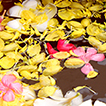
As a Thai Christian, it troubles me that after centuries of mission effort in Thailand, so few Thai people believe in Jesus Christ. In my search to understand why, I discovered some events which seem to hold the key. In 1622, Patriarch Pierre Lambert de la Motte (a Roman Catholic from France) tried to convert King Narai of Siam (as Thailand was then known) to Christianity. At that time, King Narai had a younger brother who was crippled. The king asked Lambert and all the believers to pray for his brother’s healing. After three days and nights of prayer and fasting the king’s bother was able to move his legs, and he continued to improve.1
After this, Pope Clement IX and King Louis XIV of France sent letters to King Narai inviting him to convert to the Roman Catholic Church and join in the sacraments with the priest. King Narai refused, though he cherished their goodwill. He wrote “My gratitude to King Louis XIV for your love that desired me to join your religion, but I have not had faith in my heart and it might be the will of God that He wants us to believe in different religious ways like the chapter that said God created mankind with different colors and animals with different kinds and species....”2
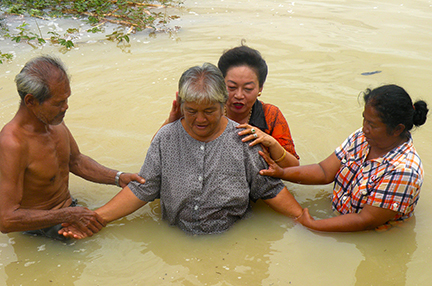 Based on this story I had two conclusions: first, Lambert and I are running into the same problems and second, though they acknowledge Jesus is very good and there is no one like Him, the majority of Thai people aren’t interested. Intrigued, I researched further.
Based on this story I had two conclusions: first, Lambert and I are running into the same problems and second, though they acknowledge Jesus is very good and there is no one like Him, the majority of Thai people aren’t interested. Intrigued, I researched further.
“After King Narai’s reign, the Christian mission in Siam began to deteriorate. The next king did not obstruct their efforts, but he did not support them either. Some of the priests continued to teach and preach the gospel in a way that was in opposition to the royal court. At the time of King Thai Sa (1730) it came to a head when Mr. Teng Butluangkraikosa charged and prosecuted the priesthood on many counts of blaspheming Buddhism. During the trial, instead of rectifying the accusation Patriarch Tesia De Cerale testified that ‘Because this world has only one God who created heaven and earth and who reigns over all, therefore humankind should have only one religion to bring us to the only good.’ This answer closed the door for the Roman Catholic Church in the Kingdom of Siam.”3 Instead of promoting understanding, De Cerale’s statement offended the Thai people and set up a future of strife, misunderstanding and failure to communicate the message.
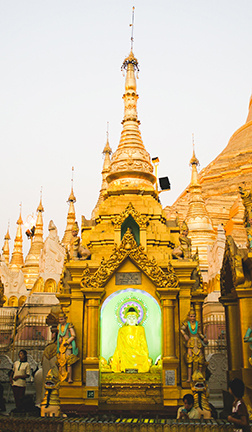 My studies showed me that this problem has existed for the last 350 years. It may be that we keep using the same methods and therefore get the same result. The Lord continued to teach me when I attended a seminar of a missions4 organization. I heard reports from various places where God is moving. One group from India reported that every day they have new disciples and thousands of people were baptized in a very short time. I could not return home without asking some questions of the people who gave the report. I and my church colleagues came away challenged in our thinking and with a greater passion for spreading the gospel. Since then we have received training from this group from India.
My studies showed me that this problem has existed for the last 350 years. It may be that we keep using the same methods and therefore get the same result. The Lord continued to teach me when I attended a seminar of a missions4 organization. I heard reports from various places where God is moving. One group from India reported that every day they have new disciples and thousands of people were baptized in a very short time. I could not return home without asking some questions of the people who gave the report. I and my church colleagues came away challenged in our thinking and with a greater passion for spreading the gospel. Since then we have received training from this group from India.
I want everyone to understand that we Christians are proclaiming the gospel to a people who are unresponsive due to the conflicts in our history. Our method of presenting the gospel has been opposed to the Thai peoples’ lifestyle, language and culture. If we had purposefully brought Jesus in a Thai way with Thai culture and language, Thai churches would be sending missionaries to Laos, Cambodia and Burma by now. But the way things were done resulted in generation after generation recognizing that following Jesus Christ meant joining a Western religion.
Thai people see Christians as employed by foreigners and as betrayers of their country. This must be the reason why believers in Thailand are under 1% and we have a shortage of young people who follow Christ. I myself was rejected by my friends and family for becoming a Christian and as a result, could not attend family funerals. My older sister passed away due to cancer but my other four siblings did not tell me because I am a Christian. I found out 18 months later. Most Thai Christians experience this same rejection.
If we acknowledge that nothing happens on its own and that God created all things then that must include Thai language and the beautiful Thai culture. It is time for us to bring what is ours back to glorify our God.
The good news needs to be announced to others in a common, natural way. The old method of presenting a Western gospel did not pierce the hearts of Thai people. They had no reason to announce it to others. But I believe today is a new day for Thailand, where words will overflow in a natural way, people will share the good news with others in a way without pressure, duty or command, where it is normal to tell the people we love most and then our neighbors, where whole families will come to Christ together.
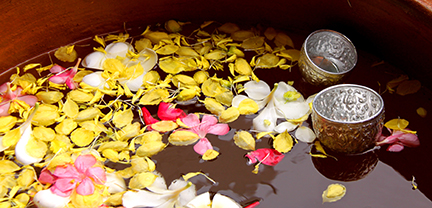 People who follow the new approach do not present Jesus as another religion, but they will say that Jesus is the way of release, nirvana, He is the truth and the life. They will not go around telling people they are sinners, but they will say “we have karma”. They will not say that the Holy Spirit anointed Jesus to declare the year of His favor to you, but that this is your golden year because if you are in Christ every year is your golden year. Every believer can lead others to salvation and perform baptisms, rather than waiting for the pastor or Sunday to come. These things demonstrate the essence of the new things God gave to us through the training from our Indian colleagues.
People who follow the new approach do not present Jesus as another religion, but they will say that Jesus is the way of release, nirvana, He is the truth and the life. They will not go around telling people they are sinners, but they will say “we have karma”. They will not say that the Holy Spirit anointed Jesus to declare the year of His favor to you, but that this is your golden year because if you are in Christ every year is your golden year. Every believer can lead others to salvation and perform baptisms, rather than waiting for the pastor or Sunday to come. These things demonstrate the essence of the new things God gave to us through the training from our Indian colleagues.
We have adjusted our words in presenting the gospel and adapted ourselves to include ceremonies and activities from the cultural and religious background of the believer (Buddhism), using the methods that Jesus gave us for adjusting to the context of Thai people, and we have seen great success. These are essentials which we have overlooked for 350 years. It maybe these things are too close or too little to see. We have seen the power of the Holy Spirit moving among believers when they read the Bible and practice daily repentance; reconciliation and mutual understanding takes place in their household, workplace and community. They lay hands on the sick and they are healed, the dead come back to life, even animals with broken legs stand up and walk, and plants that had been eaten by bugs are mended. They stop stealing and lying, and instead tell each other the truth. They are people of faith. All of this happens because Jesus is building them to be the church and the Holy Spirit is their teacher. They recognize God’s voice and we clearly see how God is wonderfully taking care of their rapid growth.
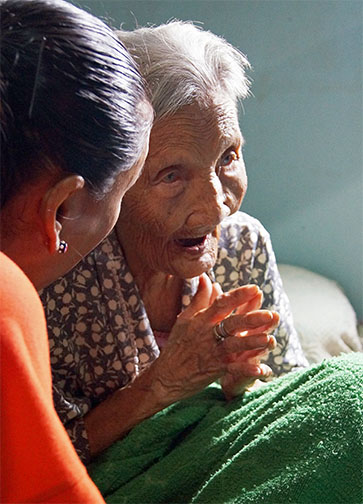 At this time all the discord in the past between Christianity and Buddhism no longer affects my coworkers and me. With this new method we cannot look at the ID cards of Thai people to verify that they are Christian,5 but we can verify the importance they give to it when we see Bible verses in homes, shops, hospitals, police stations and bus stops. People like to meet in their houses more than the temple because they have a new value in opening their homes for fellowship with one another and they receive more blessing than giving to hundreds of temples. Some blame the decrease in giving to temples on economic conditions or insincerity of religion, but the reality is people have found new value in giving money to the poor and good food to prisoners, giving money to the widows and seniors in their community. People are generous to one another, the rich give to the poor, and we see funerals that testify to life after death in Jesus Christ. Wedding ceremonies follow Thai cultural traditions in using powder to anoint the forehead as a symbol of exchanging vows in the name of Jesus. They sing their prayers to Jesus in their houses and worship with poems and proverbs. These things happen little by little until they become new traditions and new culture. All of this is the vision that God has given us to see multiplication 30, 60, and 100 times more (see Mark 4:8).
At this time all the discord in the past between Christianity and Buddhism no longer affects my coworkers and me. With this new method we cannot look at the ID cards of Thai people to verify that they are Christian,5 but we can verify the importance they give to it when we see Bible verses in homes, shops, hospitals, police stations and bus stops. People like to meet in their houses more than the temple because they have a new value in opening their homes for fellowship with one another and they receive more blessing than giving to hundreds of temples. Some blame the decrease in giving to temples on economic conditions or insincerity of religion, but the reality is people have found new value in giving money to the poor and good food to prisoners, giving money to the widows and seniors in their community. People are generous to one another, the rich give to the poor, and we see funerals that testify to life after death in Jesus Christ. Wedding ceremonies follow Thai cultural traditions in using powder to anoint the forehead as a symbol of exchanging vows in the name of Jesus. They sing their prayers to Jesus in their houses and worship with poems and proverbs. These things happen little by little until they become new traditions and new culture. All of this is the vision that God has given us to see multiplication 30, 60, and 100 times more (see Mark 4:8).
I used to pray that God would give Thai people faith. God told me, “They already have it, they were born with it, you only need to move their faith into my Name.” Since then I understood that I only have the job of introducing Jesus for them to taste as an alternative, while they remain in their religion. We do not need to tell them to throw everything away in order to come to Jesus, but while they are still believing in other gods they can call upon Jesus’ name and experience that the God who lives is better than the gods who are dead.
I want to tell every believer that we do not need to be afraid that God’s name will be tainted, damaged or in disgraced. If we present Him for Thai Buddhists to choose, He will go and sit on the throne of their hearts, even though He might be sitting with all the gods that are hanging on their necks,6 God will not feel uncomfortable or condemn us. He is very pleased and desires to be with them even though they might wear ten gods around their neck. God’s holiness will not decrease or increase because He never changes: He is the same yesterday, today and tomorrow until the end of time. And do you know? In the end they aways fall in love with the God who lives.
We see their quality of life positively changed they might not become rich, but they are happy. They have families full of laughter and reconciliation, living a healthy life, having hope. Some of them pass away from disease, but their loved ones rejoice because they do not have to suffer in the circle of life anymore but are in heaven forever.
All the power in heaven and earth was given to Jesus and He has sent us out to work, study, and cultivate rice, with a life that shows love to others that they might know we are His disciples. Teaching and making disciples will follow. The spiritual ground in Thailand is not as hard as you may think, and the number of believers is more than you may think. “Look at the nations and watch—and be utterly amazed. For I am going to do something in your days that you would not believe, even if you were told.”7 God has been active in our history and will continue until its end.
Photo Credit: Photo of the Buddist temple is by Maritha Mae Photography: http://www.marithamaephotography.com









comments